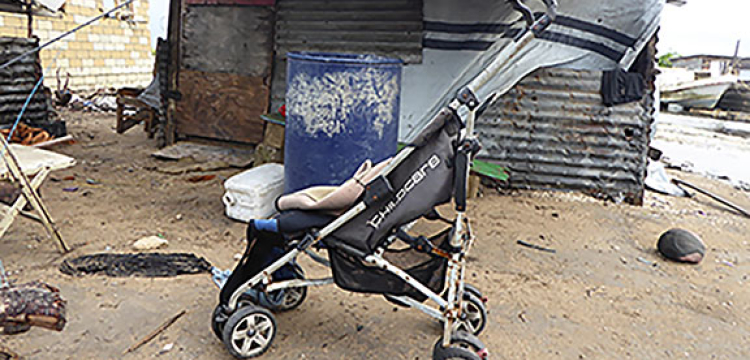This website explores how to define, measure and tackle poverty in ways that can be applied to all countries – whether high, middle or low income. In particular, it examines how the consensual approach - which defines poverty as those whose lack of resources forces them to live below a publicly agreed minimum standard - has been used in a wide range of diverse countries across the world and, in particular the UK.
-
UN target: Reducing child poverty
In 2019 the Pacific Islands adopted the consensual approach to measure progress to meeting the SDG targets.
Read more in
Oceania
In the new World section
-
Meeting the SDG goals
Read about how Uganda is tackling multi-dimensional poverty using the consensual method of measuring poverty.
Read more in
Africa
In the new World section.
-
-
-
-
The PSE research has had international impact.
Read about:
The new EU material deprivation indicators - here.
And how EU countries rank in new child deprivation index here.
What's here
The website provides a comprehensive research and teaching tool for measuring poverty using the consensual approach. This approach looks directly at living standards, as opposed to just income, and does so by examining who lacks items and activities seen by the public as the necessities of life. It is a measure of multi-dimensional poverty and includes aspects of social exclusion as well as basic needs. The context of this approach and an overview of different ways of measuring poverty can be found in Definitions of poverty
The consensual approach originated in the UK in the 1983 Breadline Britain study, which itself built on Peter Townsend's pioneering study of relative deprivation, 'Poverty in the UK'. Subsequently developed through the Poverty and Social Exclusion studies (see PSE UK), it is now being applied in countries across the World. In March 2017, the European Union adopted a new official measure of Material and Social Deprivation and, in April 2018, its first ever child deprivation measure, based on this needs-based approach to measuring poverty.
Now published
Surveys is a unique resource pulling together questionnaires from around the world which ask about the necessities of life. Here you can search which questions have been asked and where.
Under World, you can explore how a wide variety of countries across all regions of the globe have taken this approach and adapted it to their needs - in particular, for meeting the UN's Sustainable Development Goals (SDG) on poverty. Here you can explore, for examples, how Uganda has successfully introduced measures of multi-dimensional child poverty based on an enforced lack of socially-perceived necessities and why, in Oceania, the Pacific Islands have - in 2019 - officially adopted the consensual approach to meet their SDG poverty goals.
We are currently developing a searchable, multi-lingual database of all the different questions that have been asked around the world using the consensual method. You will be able to find this under Surveys, where, in the meantime, you will find an online version of the PSE 2012 questionnaires on the necessities of life.
The website also contains full documentation of the Poverty and Social Exclusion in the UK (PSE:UK) study, funded by the Economic and Social Research Council and running from 2012 to 2015. The PSE UK research conducted two major surveys, carried out in 2012, the first on people's attitudes to necessities and the second into people's living standards. It also conducted qualitative research into people's lived experience of poverty (see Life stories). It is the largest ever study into poverty in the UK.
Why has poverty risen?
Breadline Britain - the rise of mass poverty by Stewart Lansley and Joanna Mack provides an overview of the PSE UK research findings.
'Brilliant. Enlightening but disturbing' Amartya Sen
Oneworld, 2015, £9.99.
The research found high levels of deprivation across the UK with severe impacts on people's lives. Read this summary. Go to PSE UK for all the findings, reports and background to this research project, including links to the past research on which it was built. Under Publications, you will find details of the books and journal papers based on this research project and also a quick overview in some of the media coverage, and, under Reports, you will be able to find the PSE team's final reports, including the first report, The Impoverishment of the UK. Short accessible summaries of the main findings can be found under Key findings. Full data from both the living standards survey and the attitudes to necessities survey are available to investigate under Explore the data and the top level results for the living standards survey can be found under Questionnaire. You will also find details of community collaboration projects undertaken as part of this research, in particular a participatory research project in Northern Ireland, Communities in Action.
The website also includes video testimonies of living in poverty and details of projects encouraging collaboration between research and community groups, both collected during the course of the PSE UK research study. The website also includes video testimonies of living in poverty and details of projects encouraging collaboration between research and community groups, both collected during the course of the PSE UK research study. There is also an advanced search facility which allows you to restrict your search to the PSE project years, including specially commissioned articles on poverty and social exclusion in the UK.
Explore the archives
The PSE website hosts the Townsend archive containing over 2,500 questionnaires and hundreds of other documents from the 1968/69 'Poverty in the UK' survey.
You can also download the Poverty in the United Kingdom book, which set out the concept of relative deprivation, and the foundational book of the consensual method, Poor Britain.
Since the PSE:UK project finished, the PSE website has been expanded to provide a more comprehensive coverage of research undertaken across the globe.
Do contact us, if you have suggestions for improvements.






 PSE:UK is a major collaboration between the University of Bristol, Heriot-Watt University, The Open University, Queen's University Belfast, University of Glasgow and the University of York working with the National Centre for Social Research and the Northern Ireland Statistics and Research Agency. ESRC Grant RES-060-25-0052.
PSE:UK is a major collaboration between the University of Bristol, Heriot-Watt University, The Open University, Queen's University Belfast, University of Glasgow and the University of York working with the National Centre for Social Research and the Northern Ireland Statistics and Research Agency. ESRC Grant RES-060-25-0052.






